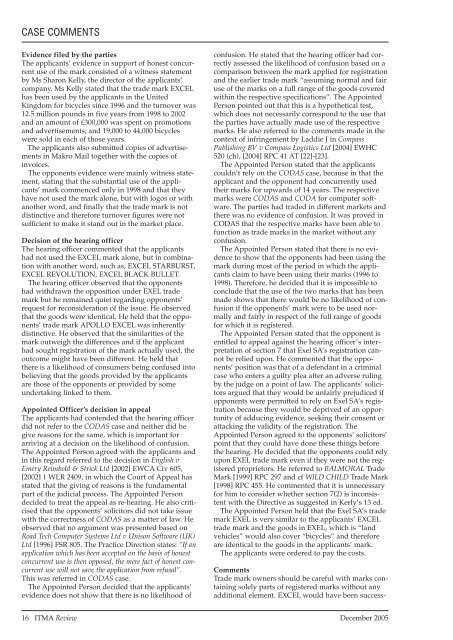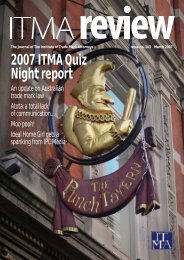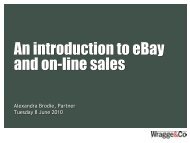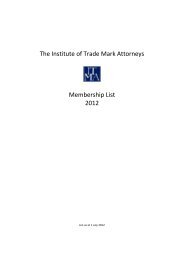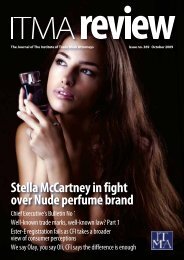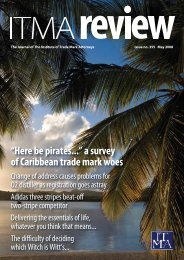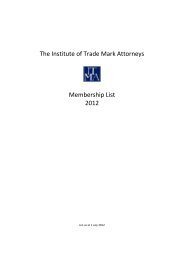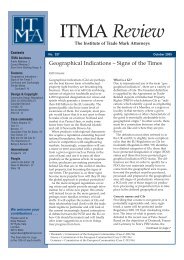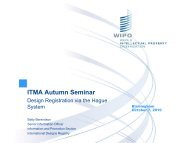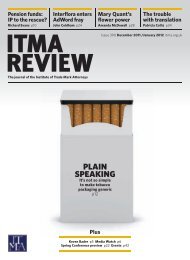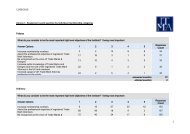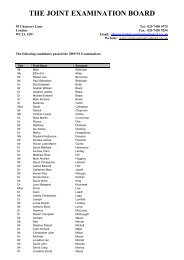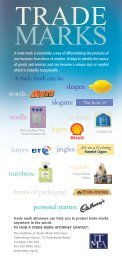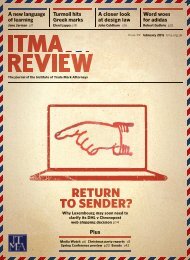ITMA 322 APRIL 2005
ITMA 322 APRIL 2005
ITMA 322 APRIL 2005
You also want an ePaper? Increase the reach of your titles
YUMPU automatically turns print PDFs into web optimized ePapers that Google loves.
CASE COMMENTS<br />
Evidence filed by the parties<br />
The applicants’ evidence in support of honest concurrent<br />
use of the mark consisted of a witness statement<br />
by Ms Sharon Kelly, the director of the applicants’<br />
company. Ms Kelly stated that the trade mark EXCEL<br />
has been used by the applicants in the United<br />
Kingdom for bicycles since 1996 and the turnover was<br />
12.5 million pounds in five years from 1998 to 2002<br />
and an amount of £300,000 was spent on promotions<br />
and advertisements; and 19,000 to 44,000 bicycles<br />
were sold in each of those years.<br />
The applicants also submitted copies of advertisements<br />
in Makro Mail together with the copies of<br />
invoices.<br />
The opponents evidence were mainly witness statement,<br />
stating that the substantial use of the applicants’<br />
mark commenced only in 1998 and that they<br />
have not used the mark alone, but with logos or with<br />
another word, and finally that the trade mark is not<br />
distinctive and therefore turnover figures were not<br />
sufficient to make it stand out in the market place.<br />
Decision of the hearing officer<br />
The hearing officer commented that the applicants<br />
had not used the EXCEL mark alone, but in combination<br />
with another word, such as, EXCEL STARBURST,<br />
EXCEL REVOLUTION, EXCEL BLACK BULLET.<br />
The hearing officer observed that the opponents<br />
had withdrawn the opposition under EXEL trade<br />
mark but he remained quiet regarding opponents’<br />
request for reconsideration of the issue. He observed<br />
that the goods were identical. He held that the opponents’<br />
trade mark APOLLO EXCEL was inherently<br />
distinctive. He observed that the similarities of the<br />
mark outweigh the differences and if the applicant<br />
had sought registration of the mark actually used, the<br />
outcome might have been different. He held that<br />
there is a likelihood of consumers being confused into<br />
believing that the goods provided by the applicants<br />
are those of the opponents or provided by some<br />
undertaking linked to them.<br />
Appointed Officer’s decision in appeal<br />
The applicants had contended that the hearing officer<br />
did not refer to the CODAS case and neither did he<br />
give reasons for the same, which is important for<br />
arriving at a decision on the likelihood of confusion.<br />
The Appointed Person agreed with the applicants and<br />
in this regard referred to the decision in English v<br />
Emery Reimbold & Strick Ltd [2002] EWCA Civ 605,<br />
[2002] 1 WLR 2409, in which the Court of Appeal has<br />
stated that the giving of reasons is the fundamental<br />
part of the judicial process. The Appointed Person<br />
decided to treat the appeal as re-hearing. He also criticised<br />
that the opponents’ solicitors did not take issue<br />
with the correctness of CODAS as a matter of law. He<br />
observed that no argument was presented based on<br />
Road Tech Computer Systems Ltd v Unison Software (UK)<br />
Ltd [1996] FSR 805. The Practice Direction states: “If an<br />
application which has been accepted on the basis of honest<br />
concurrent use is then opposed, the mere fact of honest concurrent<br />
use will not save the application from refusal”.<br />
This was referred in CODAS case.<br />
The Appointed Person decided that the applicants’<br />
evidence does not show that there is no likelihood of<br />
confusion. He stated that the hearing officer had correctly<br />
assessed the likelihood of confusion based on a<br />
comparison between the mark applied for registration<br />
and the earlier trade mark “assuming normal and fair<br />
use of the marks on a full range of the goods covered<br />
within the respective specifications”. The Appointed<br />
Person pointed out that this is a hypothetical test,<br />
which does not necessarily correspond to the use that<br />
the parties have actually made use of the respective<br />
marks. He also referred to the comments made in the<br />
context of infringement by Laddie J in Compass<br />
Publishing BV v Compass Logistics Ltd [2004] EWHC<br />
520 (ch), [2004] RPC 41 AT [22]-[23].<br />
The Appointed Person stated that the applicants<br />
couldn’t rely on the CODAS case, because in that the<br />
applicant and the opponent had concurrently used<br />
their marks for upwards of 14 years. The respective<br />
marks were CODAS and CODA for computer software.<br />
The parties had traded in different markets and<br />
there was no evidence of confusion. It was proved in<br />
CODAS that the respective marks have been able to<br />
function as trade marks in the market without any<br />
confusion.<br />
The Appointed Person stated that there is no evidence<br />
to show that the opponents had been using the<br />
mark during most of the period in which the applicants<br />
claim to have been using their marks (1996 to<br />
1998). Therefore, he decided that it is impossible to<br />
conclude that the use of the two marks that has been<br />
made shows that there would be no likelihood of confusion<br />
if the opponents’ mark were to be used normally<br />
and fairly in respect of the full range of goods<br />
for which it is registered.<br />
The Appointed Person stated that the opponent is<br />
entitled to appeal against the hearing officer’s interpretation<br />
of section 7 that Exel SA’s registration cannot<br />
be relied upon. He commented that the opponents’<br />
position was that of a defendant in a criminal<br />
case who enters a guilty plea after an adverse ruling<br />
by the judge on a point of law. The applicants’ solicitors<br />
argued that they would be unfairly prejudiced if<br />
opponents were permitted to rely on Exel SA’s registration<br />
because they would be deprived of an opportunity<br />
of adducing evidence, seeking their consent or<br />
attacking the validity of the registration. The<br />
Appointed Person agreed to the opponents’ solicitors’<br />
point that they could have done these things before<br />
the hearing. He decided that the opponents could rely<br />
upon EXEL trade mark even if they were not the registered<br />
proprietors. He referred to BALMORAL Trade<br />
Mark [1999] RPC 297 and cf WILD CHILD Trade Mark<br />
[1998] RPC 455. He commented that it is unnecessary<br />
for him to consider whether section 7(2) is inconsistent<br />
with the Directive as suggested in Kerly’s 13 ed.<br />
The Appointed Person held that the Exel SA’s trade<br />
mark EXEL is very similar to the applicants’ EXCEL<br />
trade mark and the goods in EXEL, which is “land<br />
vehicles” would also cover “bicycles” and therefore<br />
are identical to the goods in the applicants’ mark.<br />
The applicants were ordered to pay the costs.<br />
Comments<br />
Trade mark owners should be careful with marks containing<br />
solely parts of registered marks without any<br />
additional element. EXCEL would have been success-<br />
16 <strong>ITMA</strong> Review December <strong>2005</strong>


